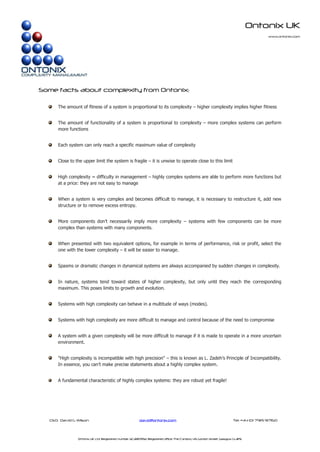
Ontonix UK: Complexity Facts
- 1. Ontonix UK www.ontonix.com Some facts about complexity from Ontonix: The amount of fitness of a system is proportional to its complexity – higher complexity implies higher fitness The amount of functionality of a system is proportional to complexity – more complex systems can perform more functions Each system can only reach a specific maximum value of complexity Close to the upper limit the system is fragile – it is unwise to operate close to this limit High complexity = difficulty in management – highly complex systems are able to perform more functions but at a price: they are not easy to manage When a system is very complex and becomes difficult to manage, it is necessary to restructure it, add new structure or to remove excess entropy. More components don’t necessarily imply more complexity – systems with few components can be more complex than systems with many components. When presented with two equivalent options, for example in terms of performance, risk or profit, select the one with the lower complexity – it will be easier to manage. Spasms or dramatic changes in dynamical systems are always accompanied by sudden changes in complexity. In nature, systems tend toward states of higher complexity, but only until they reach the corresponding maximum. This poses limits to growth and evolution. Systems with high complexity can behave in a multitude of ways (modes). Systems with high complexity are more difficult to manage and control because of the need to compromise A system with a given complexity will be more difficult to manage if it is made to operate in a more uncertain environment. "High complexity is incompatible with high precision" – this is known as L. Zadeh’s Principle of Incompatibility. In essence, you can’t make precise statements about a highly complex system. A fundamental characteristic of highly complex systems: they are robust yet fragile! CEO: David G Wilson david@ontonix.com Tel: +44 (0) 7919 917150 UK Ltd. Registered number: SC380992. Registered office: The C'a'doro, 45 Gordon Street, Ontonix UK Ltd. Registered number: SC380992. Registered office: The C'a'doro, 45 Gordon Street, Glasgow G1 3PE
